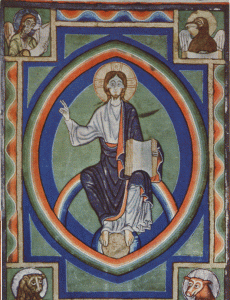 I have been presenting, basically, the history of thought on “inspiration” and the Bible. In the Middle Ages, theological reflection on the human factor was limited to following the lines of earlier thought on the subject. So much real emphasis was laid on the divine origin of the sacred book that little or no real attention was given to the activity of the human factor, except to reject with the earlier tradition any notion similar to the mantic theory of inspiration. It seems that the Church has always steered away from the idea that God has dictated the Bible word-for-word to scribes. Henry of Ghent, to be sure, denied that the human writers of Scripture could be described as mere organs or channels through which the words of divine knowledge came to mankind; rather, the writers should be thought of as true, but secondary, authors of the books of Scripture.
I have been presenting, basically, the history of thought on “inspiration” and the Bible. In the Middle Ages, theological reflection on the human factor was limited to following the lines of earlier thought on the subject. So much real emphasis was laid on the divine origin of the sacred book that little or no real attention was given to the activity of the human factor, except to reject with the earlier tradition any notion similar to the mantic theory of inspiration. It seems that the Church has always steered away from the idea that God has dictated the Bible word-for-word to scribes. Henry of Ghent, to be sure, denied that the human writers of Scripture could be described as mere organs or channels through which the words of divine knowledge came to mankind; rather, the writers should be thought of as true, but secondary, authors of the books of Scripture.
Yet this insight was never developed or given its due place in a theory of inspiration until the 19th century and especially the 20th century. Linguistic studies of the Bible and of cognate literatures and languages; increased knowledge of the general cultural background in which the Bible developed; recognition of the literary borrowings in parts of the Bible; and the detection of a number of editions of many books has shown that biblical literature has a genuine human history and that human minds have shaped the biblical books. The human personalities who worked on them apparently did everything that other human writers would have done in composing literature in any culture.
Hence, in contemporary Catholic thought great stress is placed on the Bible as truly the word of God expressed in words that are truly the product of human minds, as though two artists composed the books of Scripture: God and man.
Thus, a recent writer speaks of two incarnations: in one incarnation, the Word of God became enfleshed in human nature; in the other, the word of God became enfleshed in the language of men. Because the word of God has become enfleshed in the words and languages of human beings of different cultures and civilizations, any study of the Bible will always necessarily include investigation of the human conditions that shaped the thought and language patterns of the human authors of the Scriptures. This position is not held by all Christians.
